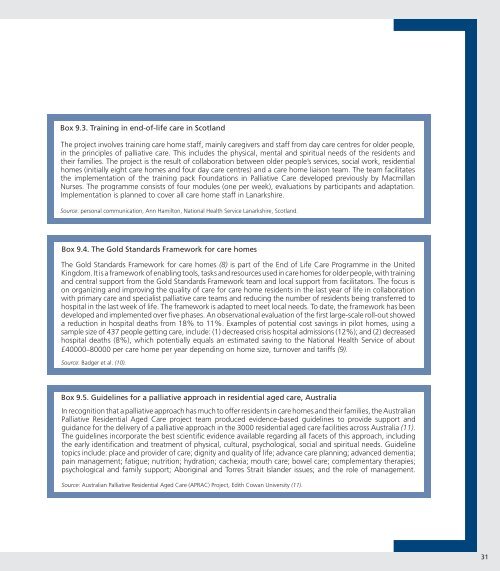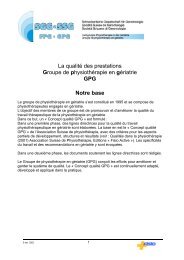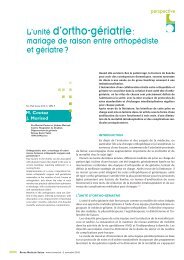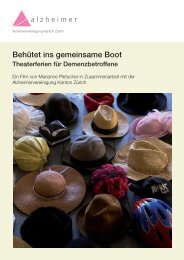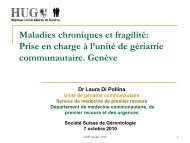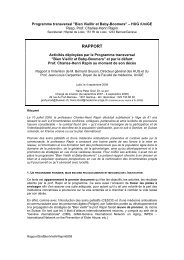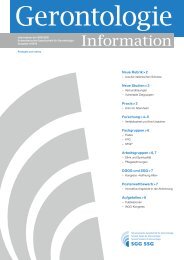Palliative care for older people - World Health Organization ...
Palliative care for older people - World Health Organization ...
Palliative care for older people - World Health Organization ...
You also want an ePaper? Increase the reach of your titles
YUMPU automatically turns print PDFs into web optimized ePapers that Google loves.
Box 9.3. Training in end-of-life <strong>care</strong> in ScotlandThe project involves training <strong>care</strong> home staff, mainly <strong>care</strong>givers and staff from day <strong>care</strong> centres <strong>for</strong> <strong>older</strong> <strong>people</strong>,in the principles of palliative <strong>care</strong>. This includes the physical, mental and spiritual needs of the residents andtheir families. The project is the result of collaboration between <strong>older</strong> <strong>people</strong>’s services, social work, residentialhomes (initially eight <strong>care</strong> homes and four day <strong>care</strong> centres) and a <strong>care</strong> home liaison team. The team facilitatesthe implementation of the training pack Foundations in <strong>Palliative</strong> Care developed previously by MacmillanNurses. The programme consists of four modules (one per week), evaluations by participants and adaptation.Implementation is planned to cover all <strong>care</strong> home staff in Lanarkshire.Source: personal communication, Ann Hamilton, National <strong>Health</strong> Service Lanarkshire, Scotland.Box 9.4. The Gold Standards Framework <strong>for</strong> <strong>care</strong> homesThe Gold Standards Framework <strong>for</strong> <strong>care</strong> homes (8) is part of the End of Life Care Programme in the UnitedKingdom. It is a framework of enabling tools, tasks and resources used in <strong>care</strong> homes <strong>for</strong> <strong>older</strong> <strong>people</strong>, with trainingand central support from the Gold Standards Framework team and local support from facilitators. The focus ison organizing and improving the quality of <strong>care</strong> <strong>for</strong> <strong>care</strong> home residents in the last year of life in collaborationwith primary <strong>care</strong> and specialist palliative <strong>care</strong> teams and reducing the number of residents being transferred tohospital in the last week of life. The framework is adapted to meet local needs. To date, the framework has beendeveloped and implemented over five phases. An observational evaluation of the first large-scale roll-out showeda reduction in hospital deaths from 18% to 11%. Examples of potential cost savings in pilot homes, using asample size of 437 <strong>people</strong> getting <strong>care</strong>, include: (1) decreased crisis hospital admissions (12%); and (2) decreasedhospital deaths (8%), which potentially equals an estimated saving to the National <strong>Health</strong> Service of about£40000–80000 per <strong>care</strong> home per year depending on home size, turnover and tariffs (9).Source: Badger et al. (10).Box 9.5. Guidelines <strong>for</strong> a palliative approach in residential aged <strong>care</strong>, AustraliaIn recognition that a palliative approach has much to offer residents in <strong>care</strong> homes and their families, the Australian<strong>Palliative</strong> Residential Aged Care project team produced evidence-based guidelines to provide support andguidance <strong>for</strong> the delivery of a palliative approach in the 3000 residential aged <strong>care</strong> facilities across Australia (11).The guidelines incorporate the best scientific evidence available regarding all facets of this approach, includingthe early identification and treatment of physical, cultural, psychological, social and spiritual needs. Guidelinetopics include: place and provider of <strong>care</strong>; dignity and quality of life; advance <strong>care</strong> planning; advanced dementia;pain management; fatigue; nutrition; hydration; cachexia; mouth <strong>care</strong>; bowel <strong>care</strong>; complementary therapies;psychological and family support; Aboriginal and Torres Strait Islander issues; and the role of management.Source: Australian <strong>Palliative</strong> Residential Aged Care (APRAC) Project, Edith Cowan University (11).31


